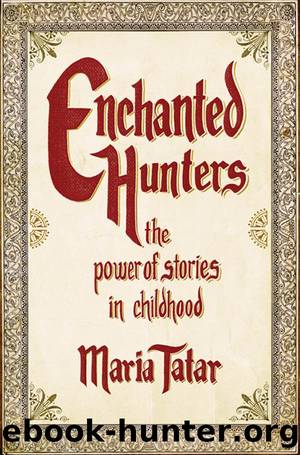Enchanted Hunters: The Power of Stories in Childhood by Tatar Maria

Author:Tatar, Maria [Tatar, Maria]
Language: eng
Format: epub
Publisher: W. W. Norton & Company
Published: 2009-04-20T00:00:00+00:00
THE WIZARD OF OZ, THE SECRET GARDEN, AND THE PHANTOM TOLLBOOTH CHAMPION the importance of learning how to do things with words, hinting that control over language conquers helplessness and vulnerability, leading to confidence and authority. The children in these works undertake quests, searches, and journeys enabling them to become masters of all they survey. They return to find dramatic home improvements—bleak scarcity shifts into vibrant abundance. The books all trumpet absolute confidence in the power of words to beautify, vivify, heal, and redeem without voicing much of the deep skepticism about language that we experience as adults.
Children, as John Locke famously reminded us, are not born in a “full state of equality,” even if they are “born to it.” We know that language and education are what can give “born to it” catalytic power, endowing children with freedom and equality, along with all the vexing cultural contradictions embedded in those concepts. Frederick Douglass recalls being taught to read by his master’s wife and listening to the outraged reaction of his master to the idea that a slave might know how to read the Bible:
The effect of his words, on me, was neither slight nor transitory. His iron sentences—cold and harsh—sunk deep into my heart and stirred up not only my feelings into a sort of rebellion, but awakened within me a slumbering train of vital thought. It was a new and special revelation, dispelling a painful mystery, against which my youthful understanding had struggled, and struggled in vain, to wit: the white man’s power to perpetuate the enslavement of the black man. “Very well,” thought I; “knowledge unfits a child to be a slave.” I instinctively assented to the proposition; and from that moment I understood the direct pathway from slavery to freedom.65
The monumental lesson embedded in the trio of books in this chapter concerns the enabling aspect of narratives and of the language used to tell them. Stories help children develop intellectual curiosity about the world, and they arouse the exploratory energy that allows them to take some control over their own destinies. “You might find anything in a place like this,” Peter declares breathlessly in C. S. Lewis’s The Lion, the Witch and the Wardrobe.66 For that reason, both writers and readers refer repeatedly to the “freedom” of story—its capacity to offer an escape into possibilities and opportunities. Who could imagine any downside to reading books like these as a child? To be sure, many voices have protested the escapist quality of some children’s books—perhaps in part because childhood books do not always receive the full approval of some adults. In James Joyce’s Dubliners, a boy is chastised for reading The Apache Chief instead of studying Roman history. But the “restraining influence” of school cannot begin to crush the “hunger” for “wild sensations” offered young readers through “chronicles of disorder.”67
It is easy to dismiss the cantankerous schoolteacher’s complaint in Dubliners, but Richard Wright and others have thoughts that can give us real pause. In Black Boy, Wright describes the reading experiences of a boy who has moved beyond Bluebeard and His Seven Wives.
Download
This site does not store any files on its server. We only index and link to content provided by other sites. Please contact the content providers to delete copyright contents if any and email us, we'll remove relevant links or contents immediately.
4 3 2 1: A Novel by Paul Auster(12354)
The handmaid's tale by Margaret Atwood(7731)
Giovanni's Room by James Baldwin(7302)
Asking the Right Questions: A Guide to Critical Thinking by M. Neil Browne & Stuart M. Keeley(5741)
Big Magic: Creative Living Beyond Fear by Elizabeth Gilbert(5727)
Ego Is the Enemy by Ryan Holiday(5394)
The Body: A Guide for Occupants by Bill Bryson(5066)
On Writing A Memoir of the Craft by Stephen King(4920)
Ken Follett - World without end by Ken Follett(4706)
Adulting by Kelly Williams Brown(4552)
Bluets by Maggie Nelson(4534)
Eat That Frog! by Brian Tracy(4501)
Guilty Pleasures by Laurell K Hamilton(4425)
The Poetry of Pablo Neruda by Pablo Neruda(4080)
Alive: The Story of the Andes Survivors by Piers Paul Read(4010)
White Noise - A Novel by Don DeLillo(3990)
Fingerprints of the Gods by Graham Hancock(3980)
The Book of Joy by Dalai Lama(3961)
The Bookshop by Penelope Fitzgerald(3828)
